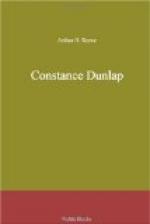“Take that first dream,” continued Constance, rapidly thrusting home her interpretation so that it would have its full effect. “You dreamed that your husband was dying and you were afraid. She said it meant love was dead. It did not. The fact is that neurotic fear in a woman has its origin in repressed, unsatisfied love, love which for one reason or another is turned away from its object and has not succeeded in being applied. Then his death. That simply means that you have a feeling that you might be happier if he were away and didn’t devil you. It is a survival of childhood, when death is synonymous with absence. I know you don’t believe it. But if you had studied the subject as I have in the last few days you’d understand. Madame Cassandra understands.
“And the wall. That was Wall Street, probably, which does divide you two. You tried to get over it and you fell. That means your fear of actually falling, morally, of being a fallen woman.”
Mildred was staring wildly. She might deny but in her heart she must admit.
“The thing that pursued you, half bull, half snake, was Davies and his blandishments. I have seen him. I know what he is. The crowd in a dream always denotes a secret. He is pursuing you, as in the dream. But he hasn’t caught you. He thinks there is in you the same wild demimondaine instinct that with many an ardent woman, slumbers unknown in the back of her mind.
“Whatever you may say, you do think of him. When a woman dreams of breakfasting cozily with some one other than her husband it has an obvious meaning. As for the messenger and the message about the United Traction, there, too, was a plain wish, and, as you must see, wishes in one form or another, disguised or distorted, lie at the basis of dreams. Take the coal fire. That, too, is susceptible of interpretation. I think you must have heard the couplet:
“’No coal, no fire so hotly glows As the secret love that no one knows.’”
Mildred Caswell had risen, an indignant flush on her face.
Constance put her hand on her arm gently to restrain her, knowing that such indignation was the first sign that she had struck at the core of truth in her interpretation.
“My dear,” she urged, “I’m only telling you the truth, for your own sake, and not to take advantage of you as Madame Cassandra is doing. Please—remember that the best evidence of your normal condition is just what I find, that absence of love would be abnormal. My dear, you are what the psychologists call a consciously frigid, unconsciously passionate woman. Consciously you reject this Davies; unconsciously you accept him. And it is the more dangerous, although you do not know it, because some one else is watching. It was not one of his friends who told your husband—”
Mrs. Caswell had paled. “Is—is there a—detective?” she faltered.
Constance nodded.
Mildred had collapsed completely. She was sobbing in a chair, her head bowed in her hands, her little lace handkerchief soaked. “What shall I do? What shall I do?”




